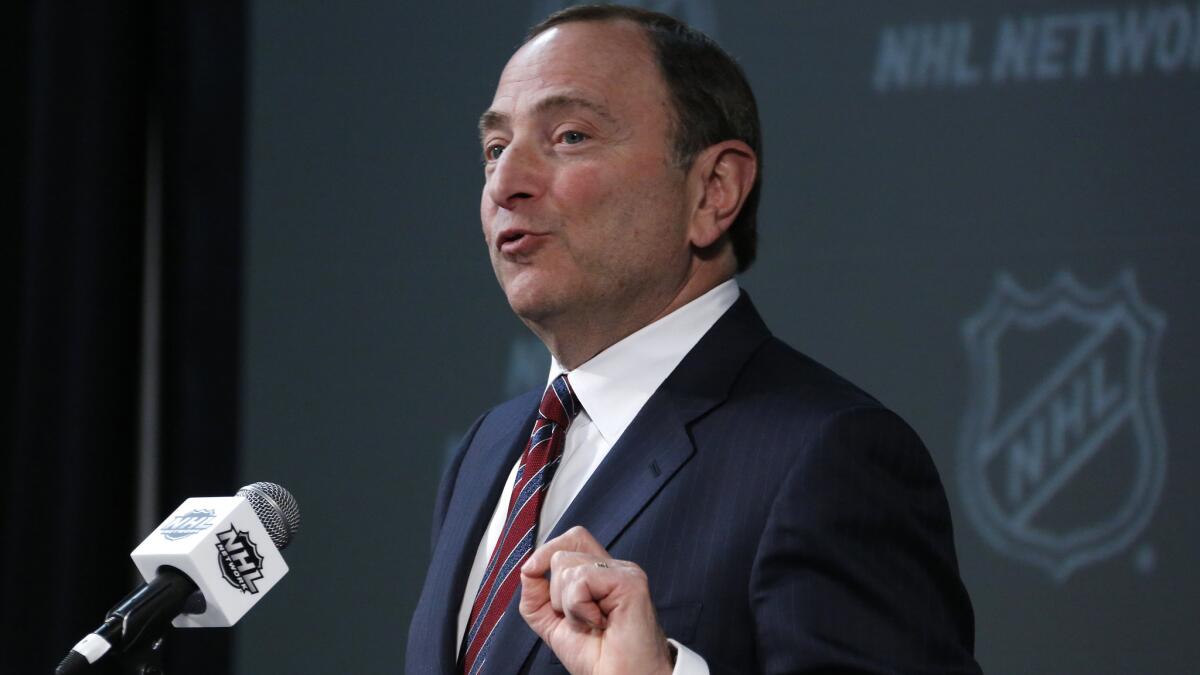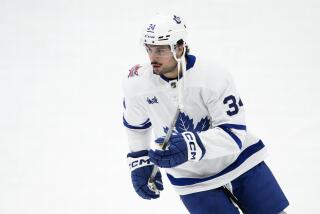NHL announces plans for World Cup in 2016

NHL Commissioner Gary Bettman announces the return of the World Cup of Hockey tournament in 2016 while speaking at a news conference in Columbus, Ohio, on Saturday.
- Share via
Reporting from COLUMBUS, Ohio — Not yet ready to expand beyond 30 franchises but eager to pull in more dollars and fans, the NHL on Saturday announced it will stage three of its popular and profitable outdoor games next season and will revive the World Cup tournament under a debatable new format in 2016.
The next Winter Classic will match the Montreal Canadiens against the Boston Bruins on Jan. 1 at Gillette Field. Stadium Series games will feature the Chicago Blackhawks and Minnesota Wild on Feb. 21 at TCF Bank Stadium at the University of Minnesota, and the Detroit Red Wings facing the Colorado Avalanche at Coors Field in Denver on Feb. 27. Field issues led the league to delay an outdoor game in Winnipeg.
The Blackhawks will be playing their fourth outdoor game and third in three years. “They’re a national draw, and they get a great deal of attention,” Commissioner Gary Bettman said at a news conference at Nationwide Arena before Saturday’s All-Star skills contests. He also said the concept of outdoor games hasn’t become stale. “Fans and our teams can’t get enough of them,” he said.
In a rare example of cooperation, the NHL and the NHL Players Assn. jointly announced details of the World Cup, to be played in Toronto starting on Sept. 17, 2016. The two-week tournament, capped by a best-of-three final, could end Oct. 1. Bettman said the World Cup revival is independent of the league’s deliberations about participating in the 2018 Winter Olympics in Pyeongchang, South Korea. The league sporadically staged Canada Cup and World Cup tournaments from 1976 to 2004.
Donald Fehr, the NHLPA’s executive director, has been a strong advocate of increasing international play to increase exposure and revenue. He’s not alone.
“We’ve grown to a $4-billion business,” said John Collins, the NHL’s chief operating officer. “The question now becomes, where does the next billion come from?”
Given that Bettman said the league is playing to 96% capacity, that next billion won’t come from ticket sales but from events like the World Cup, whose rights — unlike the Olympics — will be controlled by the league and the NHLPA. Games will be played on NHL-size ice with NHL rules and officials.
“We intend to build on this World Cup with a regular schedule of World Cups hopefully every four years in a format that will evolve,” Bettman said.
Berths will go to Canada, the Czech Republic, Finland, Russia, Sweden and the U.S. Two others will go to a team of U.S. and Canadian players 23 or younger, and to a team of Europeans from outside the major hockey nations. Each team will play three pre-tournament games and three round-robin games.
Under that format, Anze Kopitar of the Kings, who played for his native Slovenia last year in the Sochi Olympics, will play alongside rivals from Slovakia, Switzerland, Denmark, Norway and other countries. He acknowledged that might feel “a little bit weird” at first but said the caliber of the competition makes the effort worthwhile.
“As a player you want to be a part of this kind of tournament and event,” he said. “I think it’s going to be good. It’s probably going to be the best field we’ve ever seen in hockey.”
Bettman touched on several other issues while declaring the league’s competitive balance “compelling” and saying the quality of play has never been better.
He said the salary cap for next season won’t “fall off a cliff” despite the recent decline of the Canadian dollar. If the Canadian dollar is valued at 82 cents on the U.S. dollar, the cap will be $72.2 million; if it’s at 80 cents, the cap will be $71.7 million. The cap is $69 million this season.
He said the league continues to get expressions of interest from potential expansion sites but isn’t prepared to add teams. He met with Seattle Mayor Ed Murray last week but said uncertainty surrounding the construction of a new arena clouds that picture. He also said that while Las Vegas financier Bill Foley continues to gauge fans’ interest in buying tickets for a franchise in that city, the NHL is not controlling that process.
In addition, Bettman said players and pucks were fitted with computer chips for Saturday’s skills contests and Sunday’s game, the better to gather data that could educate fans and enhance TV viewing. It will be a test of the technology for future use.
::
In Saturday’s skills contest, Team Foligno defeated Team Toews, 25-19. Nashville defenseman Shea Weber won the hardest shot event for Team Toews with a shot measured at 108.5 mph., .3 off Zdeno Chara’s All-Star record. “It’s not right. Guys gotta get hit by that thing,” said Dustin Byfuglien of Team Foligno. “It’s amazing.”
The event was light-hearted, with Team Foligno goaltender Brian Elliott ignoring a shot to take a selfie and Columbus forward Ryan Johansen taking off his jersey to put on an Ohio State jersey and re-enacting the “Flying V” from the “Mighty Ducks” movie. Ducks Captain Ryan Getzlaf of Team Toews said players enjoyed the event. “It was fun. When you get on the ice with that many guys and you’re watching guys do other things, it’s pretty cool,” he said.
But for his nearly 4-year-old son, Ryder, the attraction was the mascots game before the skills contest. “He doesn’t really care that Dad’s on the ice. He was more excited to see the mascots out there,” Getzlaf said.
Twitter: @helenenothelen
More to Read
Go beyond the scoreboard
Get the latest on L.A.'s teams in the daily Sports Report newsletter.
You may occasionally receive promotional content from the Los Angeles Times.






